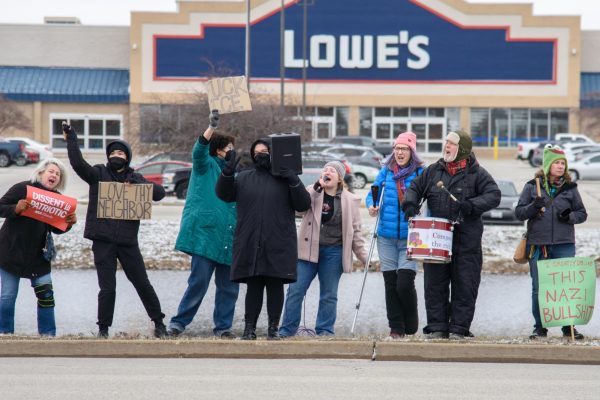Lutheran church debates gay and lesbian lifestyle
May 10, 2005
Last updated on May 11, 2016 at 09:17 p.m.
At St. Andrews Lutheran Church, the Rev. John Setterlund teaches that the Christian faith is rooted in respect, support, compassion and tolerance.
So it dismays Setterlund that the church is choosing sides on the rights of gay and lesbians and barreling toward an August showdown that both sides say could destroy the Lutheran denomination.
“I’m sad that it has captured so much attention because I don’t see it as that important of an issue,” Setterlund said.
Barring a last minute compromise, the Churchwide Assembly of the Evangelical Lutheran Church of America will decide in August whether to formally discipline churches that ordain ministers in openly gay and lesbian relationships.
Get The Daily Illini in your inbox!
The Lutheran Church specifically forbids the blessing of same-sex unions, but beyond that its rules on gays and lesbians are vague.
Its congregations span the U.S., from churches that preach against homosexuality from the pulpit to a Minneapolis church that ordained an openly gay pastor in 2004.
Those supporting the August vote and those against it agree that the church’s future hangs in the balance. Both say something needs to change to prevent a breach of union within the Lutheran denomination, but what to do is a trickier issue.
WordAlone, a grassroots organization that started in New Brighton, Minn., to fight changes in the Lutheran ordination practices.
The Rev. Mark Chavez, director of WordAlone, said he blames the dispute about homosexuality for the church’s falling membership, which, in 2003, dipped below 5 million for the first time in 20 years.
At least one Champaign County congregation left the association. St. Paul Lutheran Church in Gifford now affiliates with the Association of Free Lutheran Congregations, which leaves rulemaking to the local church.
Chavez said the conservative members he represents will not accept a national church that disregards their interpretation of the Scripture, which he said forbids homosexuality.
He called the August vote “an appeal to preserve the unity of the denomination at the expense of the truth of the gospel of Jesus Christ.”
On the other side are people like Jay Wiesner.
Wiesner converted from Lutheranism in college and trained in an Iowa seminary. He left the seminary when he realized he was gay, but returned three years later hoping to serve a church. Minneapolis’ Bethany Lutheran Church ordained him in August.
Wiesner said he was disappointed that the task force reviewing the policy on gays and lesbians stopped short of recommending major changes. Current rules require gay and lesbian pastors to remain celibate. The new rules would allow exceptions in cases where the pastor is in a long-term, committed relationship.
No matter what happens, Wiesner said he fears that blame for the dispute will fall on gays and lesbians.
“The Church could explode in August,” he said, “or maybe everyone will come to one mind.”
The Assembly will take three related votes involving gays and lesbians at the August assembly. Two would affirm that the church will “concentrate on finding ways to live together faithfully in the midst of disagreements” and let churches decide how to best minister to same sex couples – provided they do not formally bless those unions.
Caught in the middle are people like Krista Mueller, freshman in education.
Mueller came out as a lesbian during Christmas break. Her mother discussed her discomfort with a pastor at the family’s church in St. Charles, Ill., leading her to feel uncomfortable.
Mueller said she knows other gays and lesbians who have become “anti-church.” If the resolutions are passed, she said she thinks these people might return to the church because they would feel more comfortable.
“I would love it if they were more accepting because I still want to be a part of things, but it’s kind of hard when they really don’t want you there,” she said.
That kind of alienation saddens Setterlund.
Amidst the national argument, Setterlund believes most pastors are concentrating on their work behind the scenes.
For Setterlund, it means balancing the needs of his liberal campus congregation with the demands of other voices in the Church.
Setterlund said he is sympathetic to both sides. It troubles him to see Christians preaching intolerance and citing the Bible, he said.
“They’re simply looking for – and we all are – Bible verses that reinforce our preconceived notions,” he said. “That’s just bad practice. That isn’t what the Bible is for in the first place and you can prove anything by quoting Bible verses.”
Most students don’t consider the acceptance of gays and lesbians a divisive issue, he added. For these reasons, St. Andrew’s deemed itself a LGBT supportive church.
Setterlund’s views have earned him flack from other Lutheran churches, including the Gifford church.
Setterlund will not attend the August Assembly because he thinks the arguments distract from greater issues.
“If we can’t tolerate anybody whose views are different from our own,” he said, “we’re going to live in a very small world.”





